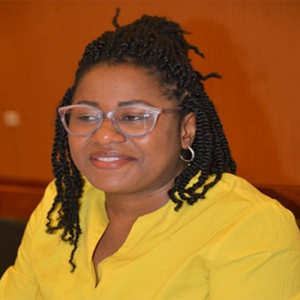Maria Ayuk is a postdoctoral researcher at the University of Magdeburg, and Chair of Political Science and Sustainable Development. She coordinates the Knowledge Transfer and Strengthening of Capacities in Global Change Context-Central Africa (KnowGlobal) project funded by CIFOR-ICRAF under the RESSAC programme framework. She holds a PhD in Global Studies from the University of Leipzig.
Prior to her current role, Maria worked as a research consultant at the German Institute of Development and Sustainability, where she evaluated the BMZ-funded African Leadership Academy. She also served as a Bonn SDG Research Fellow at the Center for Advanced Security, Strategic and Integration Studies (CASSIS) at the University of Bonn, focusing on the nexus between climate change and security in the Sahel region of Africa. Additionally, she worked as a consultant with the United Nations Convention to Combat Desertification in Bonn, specifically on the 3S Initiative (Sustainability, Stability and Security in Africa).
Maria is an alumna of several prestigious institutions, including the Clingendael Institute, Marschall European Center for Security Studies, Research Academy Leipzig, and DAAD Africa Network. She is also an accredited member of FemWise-Africa, a network of African women in conflict prevention and mediation under the Peace and Security Architecture at the African Union Commission. She is an active member of the African Diaspora Youth Network and was recognized with the prestigious Africans Rising Activism Award for her outstanding contribution to the Diaspora community in 2023.
Maria has a deep understanding of the security sector, climate issues, sustainable development, and African and European relations, which she has shared through public lectures. Her research interests focus on climate security, sustainability, knowledge transfer and forest management in sub-Saharan Africa.














